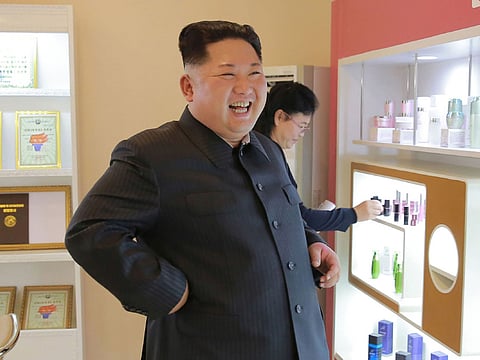A nuclear alliance to counter North Korea
South Korea’s opposition leader wants the US, South Korea and Japan to deploy atomic weapons to face the rising Pyongyang threat

The United States, South Korea and Japan should establish a “freedom nuclear alliance,” with atomic weapons deployed in all three countries to counter the rising North Korea threat, according to the leader of South Korea’s main opposition party.
Hong Joon-pyo, chairman of the Liberty Korea Party, said North Korea is not going to give up its nuclear weapons any time soon and has effectively formed a “socialist nuclear alliance” with China and Russia. So the US should abandon its policy of pressure and engagement with the regime of Kim Jong-un and move toward a new buildup of nuclear weapons in South Korea, he said. If Washington won’t oblige, South Korea and Japan should develop their own nuclear weapons to even the playing field, he told a group of Post journalists during a visit to Washington this week.
Despite criticising US policy, Hong said he likes President Donald Trump’s brash rhetoric, including his threat to “totally destroy” North Korea in his recent United Nations speech.
“One way of dealing with gangsters is to act like a gangster yourself,” said Hong, a former prosecutor. “Trump’s approach is very appropriate. If you want to deal with a tough guy, you need to be even tougher.”
For months, Hong and his party have been pushing the Trump administration to return tactical nuclear weapons to South Korea, reversing the removal of such arms by President George H.W. Bush in 1991. Trump insists the US will never accept North Korea as a nuclear power, but it is already a fact, Hong said. Therefore, Washington and its allies need to ramp up their own nuclear postures to get to a position where North Korea will bargain on reducing nukes on both sides of the North-South border.
“For the US or others to accept or acknowledge that North Korea is a nuclear state or not does not change the fact that they have the capabilities,” he said. “By having a balance of nuclear threats, we will be able to prevent the war we’ve been trying to prevent from the very beginning. And after preventing the war, we can talk about nuclear disarmament.”
Just threatening a nuclear escalation could be helpful in scaring North Korea or China into responding to international concerns about Kim’s nuclear arsenal, Hong argued. Trump should tell the Chinese government when he gets to Beijing that if Chinese officials don’t do more, the US can’t stop South Korea from going nuclear, he said.
“We need to put fear in the mind of the dictator of North Korea,” he said. “This is something that [Chinese President Xi Jinping] really wants to avoid at all costs.”
China could use its leverage to force North Korea to give up its nukes, but Beijing has no intention of doing that, Hong said. Therefore, the only reasonable conclusion is that China supports North Korea’s nuclear status.
Hong’s Liberty Korea Party is the latest iteration of the conservative party that has ruled that country for the better part of the past 50 years. Its leaders are highly critical of the government of Moon Jae-in as too soft on North Korea. They point to recent South Korean polls which showed that 68 per cent of citizens support the redeployment of nuclear weapons in South Korea and 60 per cent support South Korea developing nuclear weapons of its own.
Both Hong and Moon agree that a preventive strike on North Korea by the US, as Trump has threatened, would be a tragic mistake. Hong said he was told the US military estimates that it would take about a week to destroy all North Korean artillery aimed at the South — and that on each day of that week, there would be about 60,000 South Korean casualties.
Hong also doesn’t believe the US should try to shoot down a North Korean test missile in flight, because if it missed, “this would be a fatal blow to the credibility of the military capabilities of the US.”
But he repeatedly stressed the urgency of the crisis, which he said was reaching a climax. Hong met with CIA officials who told him that North Korea was just “a few months” from completing its drive to gain the capability to launch nuclear weapons atop intercontinental ballistic missiles and from submarine-launched ballistic missiles, he said.
US officials tell me there is no internal enthusiasm yet for returning tactical nukes to South Korea. The existing US nuclear umbrella protects South Korea from outside its borders, and putting nukes on South Korean territory adds vulnerability with little added effect; it and could fuel a regional arms race.
The Trump team also won’t concede Hong’s larger point, although it’s true. The balance of power on the Korean Peninsula is shifting in North Korea’s favour more and more every day. That weakens our negotiating position and changes the strategic calculations of allies and adversaries alike.
Honestly acknowledging that North Korea is already a nuclear power is the first step toward crafting a more realistic strategy. If neither pressure nor engagement will work, the US and its allies need a Plan B, whether it’s the scheme the South Korean opposition is proposing or not.
— Washington Post
Josh Rogin is a columnist for the Global Opinions section of The Washington Post. He writes about foreign policy and national security.



